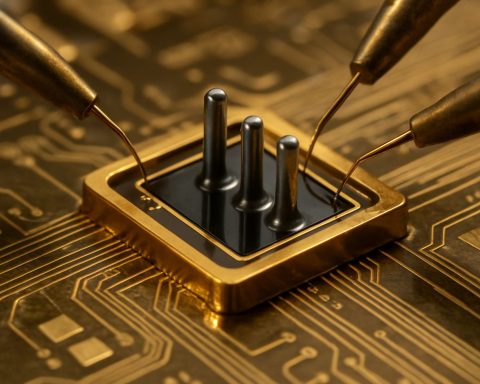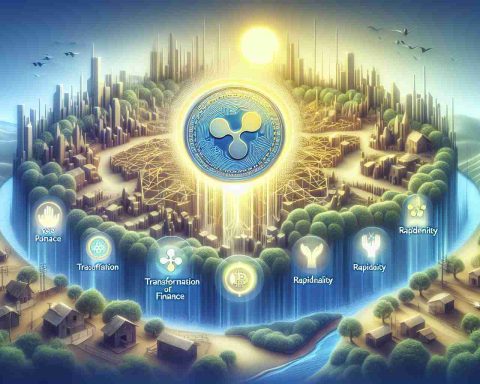The Dawn of Game-Changing Innovations in 2025
In January 2025, the tech world is buzzing with excitement as groundbreaking advancements emerge, poised to redefine industries and everyday life. Experts are discussing how Artificial Intelligence (AI) and advanced robotics are becoming integral to various sectors, driving efficiency and creativity like never before.
Significant breakthroughs are on the horizon, with AI systems not only enhancing productivity but also enabling more personalized experiences for users. This is evident in fields ranging from healthcare to entertainment, where tailored solutions are gaining traction.
One of the most notable trends involves smart interconnected devices. These devices, powered by cutting-edge AI, promise to create environments that adapt seamlessly to individual preferences. Imagine a home that anticipates your needs, adjusting lighting, temperature, and even entertainment options without prompt.
Another focal point is the emergence of autonomous vehicles. The latest prototypes showcase remarkable advancements in safety and efficiency. The potential for these vehicles to reduce traffic congestion and lower emissions could considerably shift urban landscapes.
The excitement surrounding these advancements reflects a broader movement towards a more automated and interconnected world. Individuals and businesses are eagerly watching as these innovations pave the way toward a promising technology-driven future, ensuring that 2025 will be a landmark year for modern advancements.
The Ripple Effects of Technological Innovations
As we stand on the cusp of 2025, the burgeoning advancements in technology—particularly in artificial intelligence and robotics—signal not only a shift in the way industries operate but also a profound transformation in societal norms and cultural behaviors. The integration of smart devices into our daily lives suggests a future where our environments are more responsive, fostering a lifestyle where convenience is paramount. This evolution raises questions about the implications for privacy and autonomy; can we trust these systems to make decisions on our behalf?
Moreover, the rise of autonomous vehicles brings a potential wave of economic disruption. As these vehicles become more prevalent, we can expect shifts in job markets, particularly in transportation and logistics. Conversely, the automation of such roles may also lead to significant cost savings for businesses and potentially lower prices for consumers.
Beyond societal changes, the environmental impact is crucial to consider. With decreased emissions from smarter transportation solutions and energy-efficient homes, we may witness a collective reduction in our carbon footprint. This can contribute to global climate goals, but the production and disposal of these advanced technologies present new challenges that must be addressed.
Ultimately, as we embrace these game-changing innovations, our path forward will depend on how we navigate their complexities, ensuring that technological progress aligns with ethical considerations and sustainability principles. The years to come are not only about what we can achieve but also about how these achievements will reshape our world in lasting ways.
The Future is Here: Innovations Set to Transform Our Lives in 2025
The Dawn of Innovative Technology
As we step into 2025, the tech industry is witnessing a surge of game-changing innovations that are set to reshape not only business but also everyday life. The focus is increasingly turning toward Artificial Intelligence (AI), advanced robotics, and smart interconnected devices—each playing a pivotal role in driving efficiency and creativity across various sectors.
Breakthroughs in AI and Robotics
Recent advancements in AI systems have seen them evolve beyond mere tools to become essential partners in productivity and creativity. New AI algorithms are being integrated into workflows, enabling businesses to deliver highly personalized experiences to their customers. For example, in healthcare, AI is enhancing diagnostics through predictive analytics, creating tailored treatment plans that significantly improve patient outcomes.
Robotics innovations are another key aspect of this transformation. The development of collaborative robots (cobots) is streamlining manufacturing processes and assisting in tasks that range from assembly lines to complex surgeries. Businesses are adopting these technologies to augment human capabilities and enhance overall operational efficiency.
Smart Interconnected Devices: A New Lifestyle
The rise of smart interconnected devices is one of the defining trends of 2025. These devices leverage AI to create environments that adapt in real-time to user preferences. For instance, smart homes can now anticipate needs—adjusting lighting based on the time of day or changing security settings when the owner is away. Such innovations are revolutionizing smart living, making daily routines more convenient and enjoyable.
Use Case Example: Smart fridges that manage grocery inventories and recommend recipes based on what’s available are already making waves in households, reducing food waste and enhancing meal planning.
Autonomous Vehicles: Driving into the Future
The development of autonomous vehicles is advancing at an unprecedented pace. Recent prototypes showcase not only significant improvements in navigation and safety but also promise a pathway toward reducing traffic congestion and carbon emissions. Industry experts predict that the wider adoption of these vehicles will lead to substantial shifts in urban planning and infrastructure.
For example, ride-sharing services using autonomous technology are expected to become mainstream by the end of the decade, ultimately leading to fewer personal vehicles on the road.
Pros and Cons of Emerging Technologies
Pros:
– Increased Efficiency: Automation and AI can significantly reduce human error, streamline processes, and enhance productivity.
– Personalization: Advanced algorithms provide customized experiences that can improve customer satisfaction across various industries.
– Sustainability: Innovations like autonomous vehicles can lead to lower emissions, promoting a greener environment.
Cons:
– Job Displacement: The rise of automation raises concerns about potential job losses in traditional sectors.
– Privacy and Security Issues: With the increase in interconnected devices, safeguarding user data becomes paramount.
– Dependence on Technology: Over-reliance on technology could lead to decreased human skill development.
Market Trends and Predictions
As we look ahead, the market for AI and robotics is expected to continue its upward trajectory, with predictions indicating a compound annual growth rate (CAGR) of over 30% in the next five years. The integration of AI in various sectors is set to create new job opportunities, particularly in tech development, maintenance, and ethical compliance.
Sustainability Trends: As consumers become more environmentally conscious, tech entrepreneurs are focusing on creating sustainable products. Innovations that promote energy efficiency and a circular economy are likely to dominate market discussions in the coming years.
Conclusion
The innovations emerging in 2025 signal a transformative era where technology enhances both individual lives and industries. As we embrace these advances, it is crucial to balance the excitement of new capabilities with an awareness of the accompanying challenges. The interplay between innovation and responsibility will dictate the successful integration of these technologies into society.
For more insights into the latest technological advancements, visit TechCrunch.











